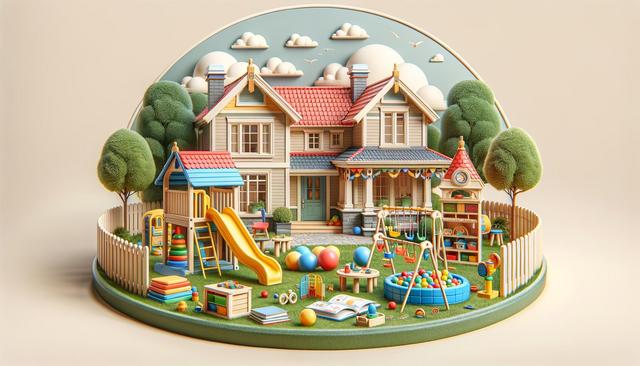
Exploring Top-Rated Preschools Near You: What to Look For
Understanding What Makes a Preschool Stand Out
Choosing a preschool is a significant decision for any parent. A great preschool experience can help children develop social skills, early academic foundations, and a love for learning. When searching for preschools near you, it’s important to look for programs that not only offer age-appropriate curricula but also provide a nurturing and safe environment. Key characteristics of highly rated preschools include licensed teachers, a structured yet flexible daily schedule, and a strong emphasis on creative play. These elements contribute to a balanced approach to early education, where children can thrive emotionally, socially, and intellectually.
Many top-rated preschools offer enrichment activities such as music, physical education, and language classes, which support well-rounded development. Additionally, an ideal preschool will encourage parental involvement and maintain open lines of communication about each child’s progress. Tour the facility, meet the staff, and observe classroom interactions when narrowing down your choices. These steps will help ensure the preschool aligns with your child’s needs and your family’s values.
Curriculum and Learning Approaches
Preschool curricula can vary widely, so understanding different learning philosophies is crucial. Some schools follow a play-based approach, emphasizing exploration and creativity, while others might adopt more structured academic frameworks. Popular early childhood education models include:
- Montessori: Focuses on independent learning and hands-on activities.
- Reggio Emilia: Encourages self-expression through art and project-based learning.
- HighScope: Utilizes active participatory learning and structured routines.
- Traditional: Emphasizes teacher-led instruction and skill-building.
Each method has its strengths and may be better suited to different learning styles. When looking at preschools near you, ask which approach they use, and consider how it matches your child’s personality. A good curriculum should foster literacy, numeracy, emotional intelligence, and physical development. It should also adapt to the developmental stages of preschool-aged children, focusing on both group and individual activities that cater to varied learning needs.
Health, Safety, and Cleanliness Standards
Another essential factor to evaluate when comparing preschools is the attention given to health, safety, and cleanliness. Young children are particularly vulnerable to illness and injury, so a well-maintained environment is non-negotiable. Look for schools that follow strict hygiene practices, such as regular handwashing routines, sanitized toys and surfaces, and clearly defined illness policies. Facilities should also be childproofed, with secure entry points, age-appropriate furniture, and easily accessible emergency exits.
Ask about staff-to-child ratios, as smaller groups allow for more personalized attention and better supervision. Also, verify that the staff is trained in pediatric first aid and CPR. When visiting preschools, observe whether children are supervised at all times and whether the outdoor play areas are secure and well-equipped. These details significantly impact your peace of mind and your child’s daily experience.
Teacher Qualifications and Staff Engagement
The quality of a preschool’s staff can make a tremendous difference in your child’s development. Highly qualified teachers typically hold degrees or certifications in early childhood education and are trained in child development, behavior management, and age-appropriate teaching strategies. Moreover, their passion and patience often shine through in how they interact with children. During your visit, observe how teachers communicate with the students—do they listen actively, encourage exploration, and guide learning with warmth and enthusiasm?
Preschools with low staff turnover usually indicate a positive working environment, which can translate into more consistent care for your child. Ask about ongoing professional development opportunities for educators, as this shows the school’s commitment to maintaining high teaching standards. In addition, support staff such as aides and assistants also play a vital role and should be equally well-trained. A collaborative, engaged teaching team fosters a setting where your child feels safe, respected, and motivated to learn.
Parent Feedback and Community Reputation
Word-of-mouth recommendations and online reviews can offer valuable insights into a preschool’s reputation. Speak with other parents in your area to learn about their experiences with different schools. Look for consistent themes in their feedback, such as the quality of communication, how issues are handled, and whether children seem happy and engaged. You can also explore local parenting forums or social media groups to gather opinions and suggestions.
Many well-regarded preschools host open houses or offer trial classes. These can be great opportunities to experience the school’s culture firsthand. During these visits, ask about how the school fosters community among families and whether there are events or volunteer opportunities that allow parents to participate. A strong sense of community helps children feel connected and supported, both at school and beyond.
Conclusion: Choosing the Right Preschool for Your Family
Selecting the right preschool involves more than just proximity—it requires careful consideration of your child’s needs, the school’s philosophy, safety standards, and teacher qualifications. By exploring these elements and taking the time to visit and research, you can make an informed decision that supports your child’s early development. Whether you’re focused on educational approach, community involvement, or practical logistics, the right preschool can be a meaningful first step in your child’s lifelong learning journey. Start with local options, ask questions, and trust your instincts—you’ll find a place where your child can grow, learn, and thrive.